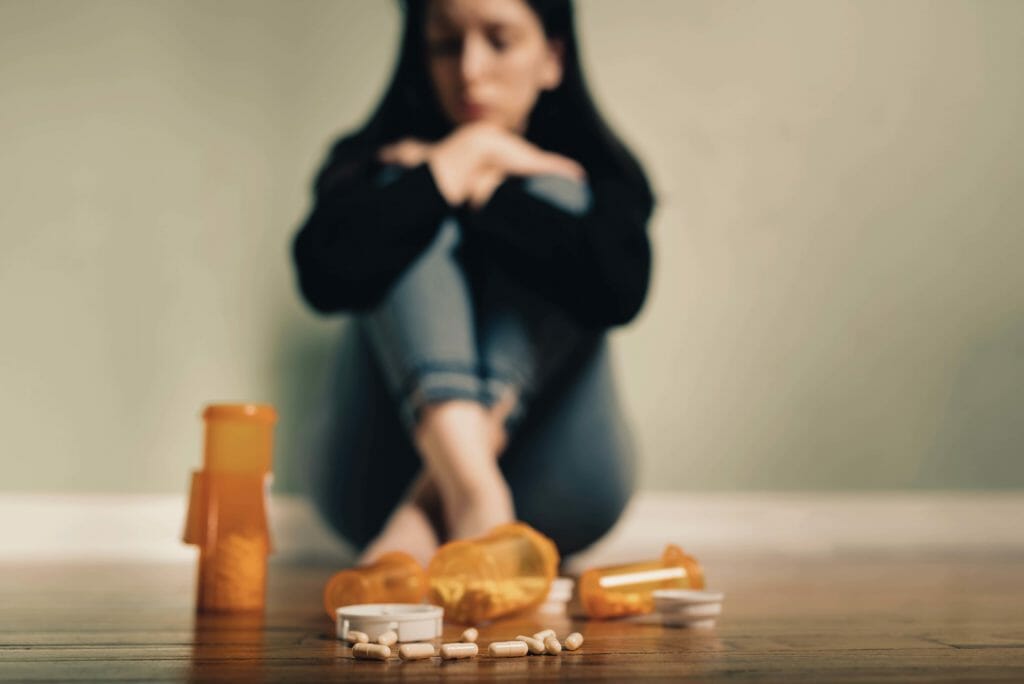OCD and Drug Addiction
 Obsessive-compulsive disorder (OCD) and substance use disorder (addiction) are mental illnesses that affect a person’s brain and behavior. It is common for people to have a substance use disorder and OCD concurrently, known as dual diagnosis or co-occurring disorder.
Obsessive-compulsive disorder (OCD) and substance use disorder (addiction) are mental illnesses that affect a person’s brain and behavior. It is common for people to have a substance use disorder and OCD concurrently, known as dual diagnosis or co-occurring disorder.
People suffering from dual diagnosis may have a substance use disorder (SUD) coupled with any mood or anxiety disorder, including OCD, bipolar disorder, depressive disorder, panic disorder, social anxiety disorder, post-traumatic stress disorder (PTSD), and others.
The 2014 National Survey on Drug Use and Health found about 7.9 million adults in the U.S. had a co-occurring disorder. Since that report, the number rose to approximately 9.2 million adults, as cited in the 2018 National Survey on Drug Use and Health. Health experts expect that number to climb, as recent studies find mental health and substance abuse issues have increased dramatically since the onset of COVID-19.
Experts find more than half of people diagnosed with a serious mental disorder also suffer from a substance use disorder. Symptoms of one disorder often mask symptoms of the second disorder, making it difficult for health professionals to determine which came first. Mental health experts recommend treating co-occurring disorders simultaneously for the best chance of long-term recovery.
What is Obsessive Compulsive Disorder (OCD)?
OCD is an anxiety disorder. Those suffering from OCD often experience unwanted, obsessive thoughts and fears which they try to dispel through repetitive, compulsive behaviors. While compulsive behaviors may deliver short-term relief, the obsession invariably returns.
The time an individual spends thinking about and trying to control obsessive thoughts interferes with their ability to perform daily activities, attend to work or school responsibilities, and maintain healthy personal and social relationships.
While many individuals with OCD have both obsessions and compulsions, it is possible to have just one or the other.
Obsessions are constant, repetitive thoughts, while compulsions are mental or physical responses or exhibiting repetitive behaviors.
According to the American Psychiatric Association (APA), the following are examples of common obsessions:
- Fear of getting contaminated by people or the environment
- Disturbing sexual thoughts or images
- Fear of blurting out obscenities or insults
- Extreme concern with order, symmetry, or precision
- Recurrent intrusive thoughts of sounds, images, words, or numbers
- Fear of losing or discarding something important
Compulsions can be in response to an obsession. For example, a person with an intense fear of contamination may respond by engaging in excessive or ritualized hand cleaning. But compulsions are not always related to obsessions.
Typical compulsions, according to the APA, include:
- Excessive or ritualized hand washing, showering, brushing teeth, or toileting
- Repeated cleaning of household objects
- Ordering or arranging things
- Repeatedly checking locks, switches, or appliances
- Constantly seeking approval or reassurance
- Repeated counting to a certain number
What is Substance Use Disorder (SUD)?
Once called drug addiction or alcoholism, a substance use disorder (SUD) is a mental disorder characterized by the persistent use of drugs or alcohol despite substantial harm and negative consequences.
The most current issue of the Diagnostic and Statistical Manual of Mental Disorders (DSM-5) classifies SUD as mild, moderate, or severe, and includes impaired control, social impairment, risky use, and pharmacological criteria in their diagnostic criteria.
Prolonged use of an addictive substance affects the brain and the behavior of the user. While the pleasure center of the brain is naturally activated when a person experiences something enjoyable, consumption of drugs or alcohol triggers a more intense response. As an individual continues to use an addictive substance, the more firmly the brain relates the use of the substance with a pleasure and reward response. Eventually, the user cannot achieve the desired response without the use of the addictive substance.
Once dependence and addiction have set in, it is difficult for a person to stop using the substance without professional help. It may also be dangerous, as withdrawal symptoms can be severe.
Why Do OCD and Addiction Frequently Co-Occur?
Severe anxiety is a known risk factor for substance use disorder. People with OCD commonly suffer severe anxiety as they attempt to control obsessive compulsive thoughts and behaviors. Experts believe many of those with OCD use drugs or alcohol to relieve stress and numb the mind from persistent thoughts.
People with OCD may self-medicate with drugs or alcohol in an effort to feel “normal.” Because this may temporarily ease internal anxiety, the person with OCD may continue to use an addictive substance to feel better.
An anxiety disorder like OCD often contributes to a person’s isolation as they find it difficult to maintain social relationships. They may even become homebound due to social anxiety coupled with the fear of embarrassment related to their behaviors. Isolation is a major risk factor for substance abuse.
OCD and Addiction Treatment
Whether you have OCD, substance use disorder, or both, help is available. If you have a dual diagnosis, it is essential that your treatment plan includes both disorders.
Studies have found the most effective approaches to treating anxiety and substance use disorders include:
- Addiction counseling
- Individual, group, and family counseling
- Medication therapy
- Cognitive-behavioral therapy: Helps a person change behavioral responses to stress, negative thoughts, and other triggers.
- Exposure and Response Prevention (ERP) Therapy: A person learns to confront fears without compulsive response.
Treatment plans differ depending on individual needs and may include treatment approaches not listed above. If you have a Substance Use Disorder, it is important you undergo medically supervised detoxification before counseling begins.
At Midwest Recovery Centers, our compassionate staff specializes in treating prescription or illegal drug dependence, alcohol dependence, co-occurring disorders, and other addictive behaviors while also providing education through a monthly support meeting for the families of those struggling.
Reviewed and Assessed by
Taylor Brown, B.A.Com., MAADC II
Tim Coleman, M. of Ed.



